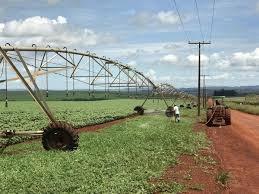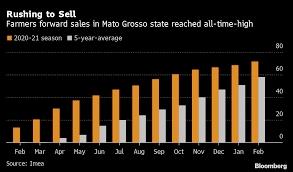 Farmers in Brazil are reneging on contracts to supply traders with soybeans. This is a response to the rapid rise in the price of soybeans that represents a super-profit for farmers. ADM, COFCO, Bunge, Cargill and Dreyfus have all encountered problems in obtaining contracted supplies at prices that were previously negotiated. The current situation of default occurred previously in 2003 following low yields due fungal infection.
Farmers in Brazil are reneging on contracts to supply traders with soybeans. This is a response to the rapid rise in the price of soybeans that represents a super-profit for farmers. ADM, COFCO, Bunge, Cargill and Dreyfus have all encountered problems in obtaining contracted supplies at prices that were previously negotiated. The current situation of default occurred previously in 2003 following low yields due fungal infection.
 Grain traders are resorting to law to enforce contracts and to oppose washout provisions. Various tactics are now employed to establish the areas of land planted and to monitor the progress of crops. These include satellite and drone observation. It is understood that up to 40 percent of contracts in some areas are subject to dispute with traders renegotiating prices that were established before planting. Traders have traditionally obtained commitments from farmers to facilitate their purchases of seed, fuel and fertilizer before planting and cultivation. Traders hedge against price fluctuation and conventionally enter into contracts with buyers in export markets.
Grain traders are resorting to law to enforce contracts and to oppose washout provisions. Various tactics are now employed to establish the areas of land planted and to monitor the progress of crops. These include satellite and drone observation. It is understood that up to 40 percent of contracts in some areas are subject to dispute with traders renegotiating prices that were established before planting. Traders have traditionally obtained commitments from farmers to facilitate their purchases of seed, fuel and fertilizer before planting and cultivation. Traders hedge against price fluctuation and conventionally enter into contracts with buyers in export markets.